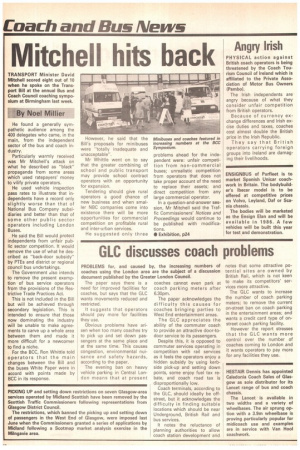Mitchell hits back
Page 20

If you've noticed an error in this article please click here to report it so we can fix it.
TRANSPORT Minister David Mitchell scored eight out of 10 when he spoke on the Transport Bill at the annual Bus and Coach Council coaching symposium at Birmingham last week.
By Noel Millier
He found a generally sympathetic audience among the 400 delegates who came, in the main, from the independent sector of the bus and coach industry.
Particularly warmly received was Mr Mitchell's attack on what he described as "black" propaganda from some areas which used ratepayers' money to vilify private operators.
He used vehicle inspection pass rates to illustrate that independents have a record only slightly worse than that of National Bus Company subsidiaries and better than that of some other public sector operators including London Buses.
He said the Bill would protect independents from unfair public sector competition. It would remove the use of what he described as "back-door subsidy" by PTEs and district or regional council bus undertakings.
The Government CI Is° intends to remove the present exemption of bus service operators from the provisions of the Restrictive Trade Practices Act.
This is not included in the Bill but will be achieved through secondary legislation. This is intended to ensure that those now dominating the industry will be unable to make agreements to carve up a whole area between them and made it more difficult for a newcomer to find a niche.
For the BCC, Ron Whittle told operators that the main changes between the Bill and the buses White Paper were in accord with points made by BCC in its response. However, he said that the Bill's proposals for minibuses were "totally inadequate and unacceptable".
Mr Whittle went on to say that the greater combining of school and public transport may provide school contract operators with an opportunity for expansion.
Tendering should give rural operators a good chance of new business and when smaller NBC companies come into existence there will be more opportunities for commercial competition on profitable rural and inter-urban services.
He suggested only three
problems ahead for the independent were: unfair competition from non-commercial buses; unrealistic competition from operators that does not take proper account of the need to replace their assets; and direct competition from any large commercial operator.
In a question-and-answer session, Mr Mitchell said the Traffic Commissioners' Notices and Proceedings would continue to be published with modifications.
• Exhibition, p24
























































































